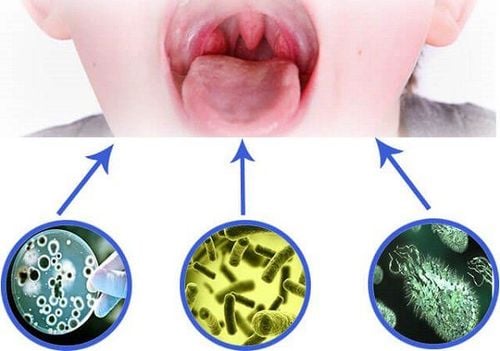This is an automatically translated article.
The article was professionally consulted by Specialist Doctor I Le Van Quang - Ear, Nose Throat Doctor - Department of General Surgery - Vinmec Nha Trang International General Hospital. BSCKI. Le Van Quang is an expert in the field of ENT with 15 years of experience.When the weather changes seasons with cold air waves, bacterial pharyngitis has a chance to break out. If not treated promptly, patients with bacterial pharyngitis may face the risk of ear infections, sinusitis, rheumatic fever (affecting joints and heart valves) or glomerulonephritis, etc.
1. What is bacterial pharyngitis?
Pharyngitis is a bacterial infection caused by the bacteria Streptococcus pyogenes (group A streptococcus). Streptococcus bacteria, after entering the throat, will cause bacterial infections in the tonsils or throat mucosa with manifestations such as sudden sore throat, fever, difficulty swallowing,... Strep throat can occur at any age. but mainly seen in children and adolescents 5-15 years old. People with weakened immune systems are also prone to this disease.2. Path of transmission of infectious pharyngitis
Infectious pharyngitis is caused by group A streptococcus, which is spread very quickly from person to person. Transmission of streptococcus can occur in the following ways:Close contact with someone who has a sore throat when they cough or sneeze; Sharing food and drinking water with patients with infectious pharyngitis; Hands touch objects with streptococci such as doorknobs, table tops, chairs, computer keyboards, ... and then bring them to eyes, nose, mouth.
3. Symptoms of bacterial pharyngitis
Strep throat in children often has the following symptoms:Unusual white spots appear in the throat: It causes burning pain, itching in the throat. Streptococcus often forms white spots and streaks in the throat and on both sides of the tonsils and makes the tonsils red and swollen; Fever: Patients with strep throat often have a high fever above 38°C. However, there are also cases where people with strep throat have no fever or have a very mild fever; Swollen neck lymph nodes: Strep throat can cause painful swollen lymph nodes in the neck. Lymph nodes are where the lymphatic cells gather, attacking and destroying invading bacteria. When an area in the body becomes inflamed, the nearest lymph node tends to swell and become painful. And in this case strep throat;

Viêm họng do liên cầu khuẩn có thể gây sưng đau hạch bạch huyết ở cổ
4. Complications of strep throat
Infectious pharyngitis is a common disease (accounting for 5 - 10% of cases of pharyngitis), although less common than viral pharyngitis (accounting for 40 - 80% of cases), but often more serious and often Occur again periodically.If not treated promptly or not given the right antibiotics, strep bacteria can enter the bloodstream, reach the heart or other organs in the body and lead to serious complications. Specifically, the disease can lead to complications of ear infection, sinusitis, tonsillitis,... In particular, the most serious complication of bacterial pharyngitis is rheumatic fever (affects joints and heart valves). ), glomerulonephritis ,...
5. Method of diagnosing bacterial pharyngitis

Phương pháp chẩn đoán viêm họng nhiễm khuẩn
Take a sample of the throat fluid: To determine the presence of streptococcus pyogenes bacteria or not; Antigen test: Performed when the results from the fluid sample do not meet the doctor's order.
6. Treatment of strep throat
If you are diagnosed with a sore throat caused by an infection, you will be prescribed antibiotics for 7-10 days. The condition will gradually improve in the first 1-2 days of using the drug, but the patient needs to take a full dose to ensure that the bacteria are completely destroyed.Medicines to treat pharyngitis caused by bacteria include:
Group of antibiotics: Mainly used in the treatment of bacterial pharyngitis, helping to prevent the growth of bacteria and prevent complications. Antibiotics can be taken in pill or injectable form. Commonly used drugs include: beta-lactam drug group (amoxicillin combined with clavulanic acid, cephalexin, ceftriaxone,...) and macrolide drug group (erythromycin, clarithromycin, azithromycin,...); Group of pain relievers and antipyretics: Including paracetamol, aspirin, used to relieve symptoms caused by sore throat such as sore throat, difficulty swallowing, fever,...; NSAID group of anti-inflammatory drugs: Including ibuprofen, diclophenac, ... are used to reduce inflammatory symptoms such as swelling, heat, redness, pain caused by sore throat; Group of anti-inflammatory corticosteroids: Including prednisolone, dexamethasone, betamethasone, ... used in the treatment of severe sore throat; Mouthwash solution: Ingredients often contain antibacterial, anti-inflammatory and local anesthetic agents, which help relieve pain and remove bacteria from the mouth; Sore throat lozenges: The main effect is to relieve pain and treat infections of the mouth and throat. The composition of the drug often contains antibiotics, anti-inflammatory agents and local anesthetics. Note:
Do not use aspirin for children because it can cause Reye's syndrome (a form of encephalopathy - liver disease) which is very dangerous; Do not use aspirin, corticosteroids and non-steroid anti-inflammatory drugs for patients with a history of peptic ulcer disease; When using antibiotics, patients need to adhere to the correct time of the treatment regimen, avoid arbitrarily stopping the drug because it will cause the risk of antibiotic resistance later on; Follow the doctor's instructions exactly to avoid experiencing side effects when using the drug.
7. Preventing and stopping the progression of bacterial pharyngitis

Ngăn chặn diễn tiến của viêm họng nhiễm khuẩn xung quanh
Please dial HOTLINE for more information or register for an appointment HERE. Download MyVinmec app to make appointments faster and to manage your bookings easily.













